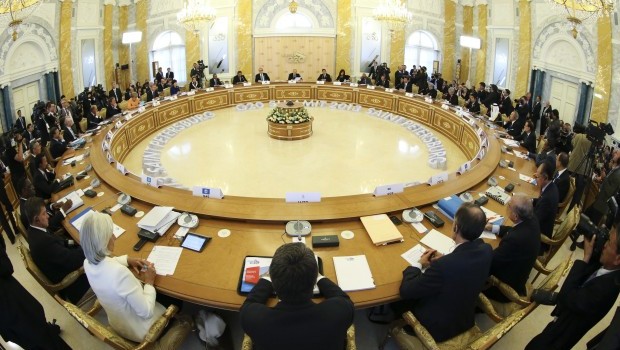
General view of the first working session of the G20 summit on September 5, 2013, in Saint Petersburg, Russia. (AFP PHOTO/POOL/SERGEI KARPUKHIN)
China had earlier ruled out the possibility of a meeting between the two on the sidelines of the St. Petersburg summit. China has put relations with Japan in the deep freeze since last September when Tokyo nationalized a group of islands claimed by China.
However, the official Xinhua News Agency said Xi met with Prime Minister Shinzo Abe in a VIP room on Thursday for a “brief talk.”
Xinhua said Xi told the Japanese leader that ties between their nations were facing “grave difficulties,” and that Japan should “correctly deal” with sensitive issues such as the islands dispute. Problems should be handled “in line with the spirit of facing history squarely and looking forward to the future so as to seek a way to properly manage differences,” Xinhua quoted Xi as saying.
It said that Abe responded by saying he was “eager to improve Japanese–Chinese relations.”
Japan’s Mainichi Shimbun newspaper said the meeting lasted about five minutes and the two remained standing the entire time, apparently to emphasize its impromptu nature.
The newspaper said the men reiterated their basic positions, albeit in a polite manner, and that Abe said bilateral relations should develop “on a strategic basis.”
While brief and informal, the exchange was the first the two have had since Abe returned as prime minister and Xi took over as head of the ruling Communist Party last year. While unlikely to bring an immediate end to the tensions, it appeared to be a sign that Xi does not want a further deterioration in ties.
Chinese anger at Japan’s move to buy the tiny, uninhabited islets in the East China Sea sparked violent protests and destruction of Japanese property in several Chinese cities. Beijing also began sending patrol ships to confront Japanese vessels in waters surrounding the islands, called Senkaku by Japan and Diaoyu by China.
While tensions have receded somewhat in recent months, China has yet to restore regular contacts and it called in the Japanese ambassador last month to protest over visits by Japanese ministers to a Tokyo shrine at which fallen soldiers, including convicted war criminals, are worshipped.
